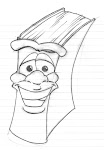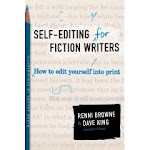Quick Interruption!
Before we turn this post over to Darlene, I wanted to let everyone know that Sandi has temporarily turned the reins over for The Book Doctor. Sandi is currently in the hospital undergoing treatment unrelated to MS. Please join us in praying for her and for her family. We know she'll be back with us soon and we'll keep things going here until she returns. We'll be posting periodic updates, so keep checking back.
Blessings,
The Crew at Book Doctor
R.U.E. (resist the Urge to Explain)
The writer creates between two opposites: the reader wants to know and R.U.E. (resist the urge to explain, or more colorfully put, the reader's not stupid!)
Example of "the reader wants to know" (taken from the copyedit of my next published book, Love's Raid, coming out next March from Heartsong Presents):
The grocer’s wagon flew past Clara Farley, the wheels spewing dirt and rocks, coating the skirt of the dress she had chosen for this special occasion.
The copy editor said, "I couldn’t immediately figure out if she was walking, on horseback, or driving." Okay. I need to put in a word or two indicating she's on foot.
Example of R.U.E., from my current WIP, Knight Music, scheduled for release next October. It comes at the end of the first chapter:
Why did he feel like his success would depend on Sonia? Of all people, Sonia was the one person he couldn't count on.
What's the R.U.E. section? The second sentence. The first sentence says it all. Out it goes . . .
How to we know when to add and when to delete?
Adding usually is needed when we need to clarify something. If the heroine arrives somewhere by horse, I need to show her taking care of the horse before she goes inside.
Deleting is harder to detect. Some examples:
- Overemphasis? Am I overemphasizing something that makes no difference in the story, the equivalent of the gun in the room? In my current WIP, the heroine (Sonia, of course), is sketching in a prayer journal. I use it as a means to show her thoughts about the hero. When I say people like to peek into her journal, am I implying later in the story someone will peek into the journal--and see something they shouldn't? Either I delete the comment--or I add a bit more about the journal later in the story.
- Planting hints? When is enough enough? The hero in my WIP (we eventually discover) has a dark secret in his past. My hints must walk a fine line between making it believable when the reader discovers the truth; or hitting the reader over the head with it. Examples:
--Maybe that was what happened when her best work was stolen and she lost her sense of direction. He ought to know. Hadn’t he come to Ulysses for much the same reason? His mouth twisted at the irony of it.
--Four pages later: He could tell the truth, up to a point.
--One page later: “And I apologize for soaking your shirt. So we’re even. Sort of.”
If only she knew the truth.
--A page after that: He knew exactly what he intended to do to get back into his family’s good graces, but he wasn’t about to tell anyone.
--Four pages later: Ty wandered downe the aisle ahead of her, and with the arch of an eyebrow, grabbed a box of cereal with a cartoon vampire on the front. “I’m like this cereal. I’m irresistible, but ultimately, I’m bad for you.
Looking at it this way, I suspect I'm overdoing it a little. Hmm. Good exercise.
In your own work, look for both problems:
Is something unclear that needs additional explanation?
Is something overstated and needs to be shortened?
Feel free to share examples from your writing and let us help!












No comments:
Post a Comment